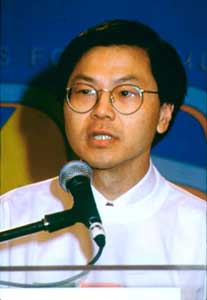-
- N.Y.C. health authorities find rare drug-resistant form of HIV that rapidly progressed to AIDS
- Massachusetts attorney general now says he backs same-sex marriage
- Survey: Many school counselors not trained to help gay students
- Opponents and supporters of same-sex marriage in New York pin their hopes on state’s top court
- San Francisco mayor defends his order to issue marriage licenses to same-sex couples
- Marine recruiter tries to explain ‘Don’t Ask, Don’t Tell’ policy
- National News Briefs
- World News Briefs
san diego
Rare form of HIV strain hits San Diego
N.Y.C. strain may be tied to an HIV-positive San Diego resident
Published Thursday, 17-Feb-2005 in issue 895
After a rare, potentially aggressive drug-resistant strain of HIV was found in an ill New York City man last week, the San Diego County Health Department called a press conference on Feb. 14 to announce that a San Diego resident may possibly have a similar HIV strain.
The New York man’s identity has not been released at this time. However, it has been reported that his health has quickly deteriorated and he has become resistant to most anti-viral medications. A blood sample from the man was compared with a national databank containing genotypes of HIV and a match showed up in San Diego, as well as in one other New York City unidentified person.
Dr. David Ho, director of the Aaron Diamond AIDS Research Center, told the New York Times he would not know if the samples of the San Diego and New York patients are an identical match for at least a week, the New York Times reported Feb. 14.
“When they scanned for a match to the strain that the man had in New York City, they found a match from somebody that had been tested in San Diego,” said Dr. Nancy Bowen, San Diego County’s public health officer.
Bowen said it is typical once a person has tested positive for HIV to test their blood again to ensure the patient’s particular strain will not be resistant to certain anti-viral medications due to the complex, mutating nature of the AIDS virus over time.
She explained a test revealed the strain’s genetic fingerprint was similar to the strain of the New York City man, who has become very sick with AIDS only two to three months after he was initially diagnosed with HIV. Health officials say this rapid progression is rare since the average time period between HIV infections and AIDS is usually between seven and 10 years.
While the San Diego patient had tested positive for HIV last fall, Bowen said the San Diego County health department has not been able to identify who the patient is at this point in time, but is hopeful they will determine the identity soon.
“The CDC [Centers for Disease Control and Prevention] has contacted the lab that has this databank to start the process of finding who was the provider who sent in the sample from the person in San Diego,” said Bowen. “We are anticipating that we will be able to talk to the patient, hopefully find out from him [or her] if he [or she] has contacts, who they are, then talk to them and make sure they’re tested and that all of them know that the possibility of this strain that they are carrying is very drug resistant.”
ViroLogic, a laboratory in South San Francisco, has the patient’s genetic HIV fingerprint on file. They will contact the patient’s healthcare provider in order to locate the patient by identifying and contacting their doctor. If the test was administered anonymously in which a name is not given, health officials may never find out the identity of the infected San Diego resident.
According to the New York City Department of Health and Mental Hygiene, the New York man had unprotected sex with many sexual partners recently while using the drug crystal methamphetamine, which has played a significant role in facilitating the transmission of HIV. Some health officials believe the man’s sexual partners in the last few months has surpassed 100. Bowen added some of the man’s partners may have been from California but there is no way to determine that at this point.
Health officials have speculated the New York man may be genetically predisposed to a rapid progression of HIV infection. Dr. Ho told the New York Times that there might have been genetic factors in the man which made the HIV strain more aggressive.
Bowen sees the logic in Dr. Ho’s speculation. “There might just have been something wrong with this man’s immune system as the reason he got sick so quickly,” said Bowen. Although Bowen thinks this HIV strain in San Diego is isolated, she still cautioned the public to always continue safe-sex practices, or abstain from sex to mitig`te the risk of HIV infection.
“We have no reason to think this is really widespread,” said Bowen. “It’s an opportunity to re-emphasize, of course, all the messages that we have been doing all along to keep people safe and decrease HIV infections.”
|
|
Copyright © 2003-2025 Uptown Publications


